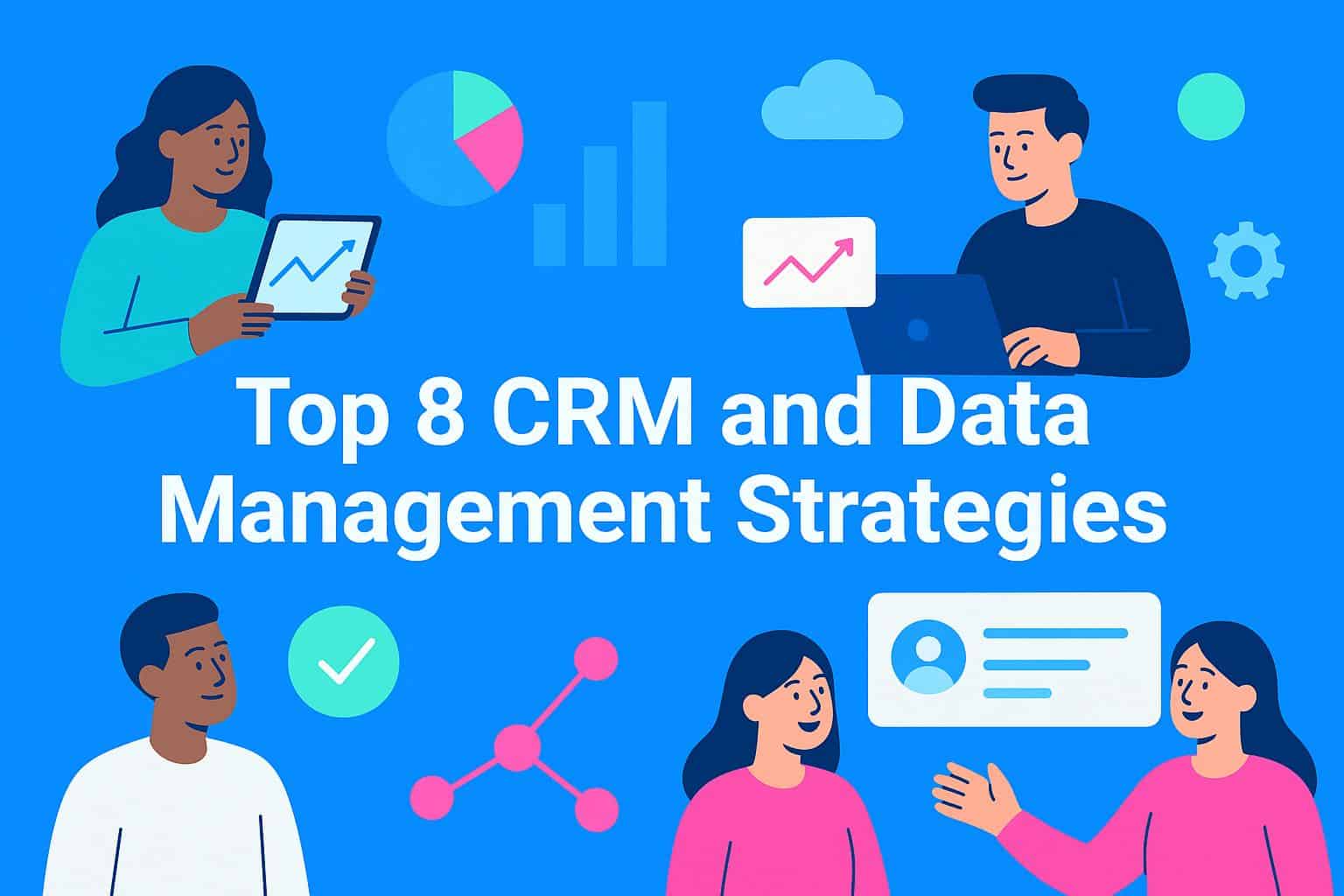Why Smart Data Management Drives Startup Growth…
Customer Relationship Management (CRM) systems have evolved from simple contact databases into sophisticated growth engines that can make or break a startup’s trajectory. Despite 91% of companies with more than 11 employees now using CRM systems, the gap between CRM adoption and CRM success remains alarmingly wide. For tech startups in competitive markets with limited resources, understanding how to utilise CRM systems effectively can be a competitive imperative.

The CRM Adoption Paradox
The statistics paint a fascinating paradox. While CRM adoption has reached near-universal levels in the business world, only 40% of users report high adoption within their teams. Even more troubling, 70% of CRM projects fail due to poor user adoption or a lack of strategy. This disconnect reveals a critical truth that buying a CRM and successfully implementing one are entirely different challenges.
For B2B tech startups, this gap represents both a warning and an opportunity. The warning is clear: simply purchasing a CRM won’t transform your marketing and sales operations. The true opportunity lies in the fact that startups willing to invest in proper implementation and adoption can dramatically outperform competitors who treat CRM as just another software subscription.
Is There a Data Quality Crisis?
Perhaps the most sobering statistic for startup founders is that poor data quality costs U.S. businesses over $3 trillion annually. For resource-constrained startups, the impact of dirty data can be even more devastating, resulting in wasted marketing spend, missed opportunities and frustrated sales teams.
The challenge becomes even more apparent when we consider that sales reps spend 17% of their day entering data into CRM systems, yet 82% of B2B companies cite data quality as a barrier to sales effectiveness. This creates a vicious cycle where teams spend significant time on data entry, but the data remains unreliable, leading to poor decision-making and ultimately, resistance to using the system at all.
The Importance of Integration
The most successful startups are discovering that CRM systems shouldn’t exist in isolation. Companies that integrate CRM with marketing automation platforms increase qualified leads by 45%, an improvement that could be the difference between survival or failure. This integration creates a seamless flow of information between marketing and sales, ensuring that no lead falls through the cracks and that every prospect receives appropriately timed, relevant communications.
The benefits extend beyond lead generation. Businesses utilising CRM systems improve customer retention by 27%, while CRM implementation boosts sales productivity by 29% on average. For startups, where every customer counts and sales team efficiency directly impacts runway, it could make the difference between scaling successfully and running out of cash.
Does AI Provide an Advantage?
Forward-thinking startups are already using artificial intelligence to extract maximum value from their CRM investments. Sales teams using AI-driven CRM analytics outperform their peers by 18% in quota attainment, while automated CRM data entry increases forecast accuracy by 32%. These AI capabilities address two critical pain points: the time burden of manual data entry and the challenge of making sense of vast amounts of customer data.
For startups competing against better-resourced competitors, AI-powered CRM tools can represent a force multiplier. They enable small teams to operate with the sophistication of much larger organisations, identifying patterns, prioritising leads and predicting outcomes with remarkable accuracy.
Top CRM and Data Optimisation Strategies:
1. Start with Strategy, Not Software
Before selecting a CRM system, define clear objectives. What specific problems are you trying to solve? How will you measure success? Which processes need to be standardised? Starting with a strategy dramatically improves the odds of avoiding the 70% failure rate that plagues CRM implementations.
2. Prioritise User Adoption from Day One
Given that only 40% of users report high adoption, startups must treat implementation as a change management project, not a technology project. This means involving marketing and sales teams in the selection process, providing comprehensive training and designating CRM champions within each team. Consider that 88% of B2B salespeople want CRM tools that help prioritise leads, so choose a system that makes their jobs easier, not harder.
3. Automate Data Entry Wherever Possible
Since automated CRM data entry increases forecast accuracy by 32% and reduces the 17% of time sales reps spend on manual entry, investing in automation tools is a worthy priority. Integration with email, calendar and communication platforms can capture much of this data automatically, freeing sales teams to focus on selling.
4. Implement Data Quality Standards Early
Establish clear protocols for data entry before bad habits take root. Simple standards like required fields, naming conventions and regular data hygiene audits can prevent small problems from becoming expensive disasters. Remember that 82% of B2B companies struggle with data quality, so being in the 18% that don’t may provide a significant competitive advantage.
5. Integrate Marketing and Sales Systems
The 45% increase in qualified leads from CRM and marketing automation integration is too significant to ignore. Startups must prioritise platforms that offer native integrations or robust APIs. This integration enables lead scoring, automated nurture campaigns and seamless handoffs between marketing and sales.
6. Set Realistic Implementation Timelines
With 50% of CRM implementations taking longer than expected, build buffer time into your rollout plans. A phased approach, starting with core functionality and gradually adding advanced features, usually works better than attempting a complete transformation in one step.
7. Utilise AI and Analytics
Don’t wait until you’re larger to adopt AI-powered features. The 18% improvement in quota attainment for teams using AI-driven analytics can accelerate growth and help startups punch above their weight class. Many modern CRM platforms now include AI features at accessible price points.
8. Focus on Metrics That Matter
With CRMs increasing deal conversion rates by 15% on average and improving sales velocity, it helps if you establish baseline metrics before implementation. This means you can track and compare conversion rates before and after, such as sales cycle length, customer acquisition costs and retention rates. Only 47% of users believe their CRM improves sales velocity, so it’s important for you to be in the half that can prove it does.
The Future of Data Management
CRM systems represent one of the highest-leverage investments a startup can make, but only when implemented thoughtfully. The 29% boost in sales productivity and 27% improvement in customer retention available to effective CRM users can dramatically accelerate growth trajectories. However, joining the 70% of failed implementations wastes precious resources and creates organisational cynicism around data-driven processes.
For tech startups, the path forward is clear: treat CRM implementation as a strategic initiative, not a technology purchase. Prioritise user adoption and data quality over feature lists. Automate relentlessly to free your team for high-value activities. Integrate your marketing and sales tech stack to create seamless customer journeys. Finally, utilise AI to help level the playing field against your better-resourced rivals. The startups that master these disciplines will turn their CRM system into a genuine competitive advantage, setting strong foundations to support future growth.
*Sources:
- 91% of companies with more than 11 employees use a CRM system (Source: Grand View Research).
- Sales reps spend 17% of their day entering data into CRM (Source: HubSpot).
- Only 40% of CRM users report high adoption within their teams (Source: Forrester).
- Businesses that use CRM systems improve customer retention by 27% (Source: Salesforce).
- CRM implementation boosts sales productivity by 29% on average (Source: Nucleus Research).
- Poor data quality costs U.S. businesses over $3 trillion annually (Source: IBM).
- 70% of CRM projects fail due to poor user adoption or lack of strategy (Source: Gartner).
- Automated CRM data entry increases forecast accuracy by 32% (Source: InsideSales).
- 82% of B2B companies cite data quality as a barrier to sales effectiveness (Source: SiriusDecisions).
- Companies with integrated CRM and marketing automation increase qualified leads by 45% (Source: Act-On).
- On average, CRMs increase deal conversion rates by 15% (Source: Zoho).
- 88% of B2B sellers want CRM tools that help prioritize leads (Source: LinkedIn).
- Only 47% of CRM users believe their system helps improve sales velocity (Source: CSO Insights).
- 50% of CRM implementations take longer than expected (Source: Capterra).
- Sales teams using AI-driven CRM analytics outperform peers by 18% in quota attainment (Source: McKinsey).
You may want to read: “How to Define Your Target Market.”







